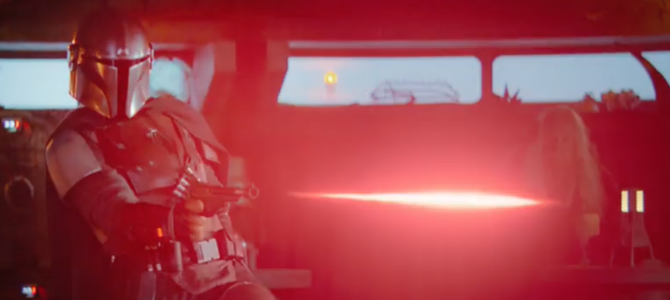
Spoilers for the “Star Wars” universe ahead.
“Luke Skywalker? I thought he was a myth,” exclaims Rey in the first half of “The Force Awakens,” Disney’s inaugural venture into the “Star Wars” universe. Disney acquired the franchise in 2012 and recently launched “The Mandalorian” on its new streaming service, Disney Plus. It is a defining moment for the space fantasy that has shaped American culture for the last 40 years.
Disney has the sacred duty of stewarding the “Star Wars” canon, maintaining all previous installments, and pushing the epic forward. They have promised more feature films after “The Rise of Skywalker” in December 2019 and released “The Mandalorian” as a serial show on Disney Plus this month.
Faithful fans of the original trilogy were skeptical of any additional movies when the prequels were announced. After the failures of “Episodes 1-3,” their hostility was justified. The second trilogy has many problems, but most are the repercussions of turning to the dark side of modernity, of being seduced by the material. Either The Force holds divine authority or it does not. On this doctrine, right Disney is.
“Star Wars” may be a modern creation, but it has deep roots in the Western canon. Odysseus was overcoming challenges while discovering divine truth long before Luke Skywalker. Other myths that share “Star Wars’s” ancient origins include “Lord of the Rings” and “The Chronicles of Narnia.” Both are good, but these tales center around kings and queens, bows and arrows, elves and dwarves—imagery reminiscent of medieval Britain.
“Star Wars” is uniquely American. It speaks of republics, political revolution, and freedom. Its characters are like those of the American Western, our own contribution to humanity’s tradition of myth telling. Heroes are unabashedly individualistic but committed to the common good. They prevail over their enemy through a combination of skill, grit, and luck. Villains seek absolute power through violence, intimidation, and conformity.
As in real life, mythical characters are faced with choices that have consequences. Should Han Solo leave with his reward or return to fight the Empire with his friends? Should Luke face his father, or submit to the dark side?
In a universe that so starkly contrasts good and evil, there must be something guiding these moral questions. It must be transcendent, surrounding us, penetrating us, and binding the galaxy together. The Force demands divine authority.
The originals introduced a robust religious tradition with believers and skeptics. It’s mystical yet demonstrates real power in real moments, like lifting a sunken X-Wing or shooting an ion torpedo through a hole no bigger than a womp rat.
It is intimately connected to life and creation. It is personal enough that Yoda, a great master of The Force, calls it an ally. Access to its power doesn’t depend on outwardly attributes like size or strength, but on virtue, devotion, discipleship—things of the soul. The Force is also noticeably connected to families, as a faith to pass down and train others in.
But in “The Phantom Menace,” The Force is reduced to quantifiable units of midiclorians. This is the original sin of the prequels: stripping The Force of its spirituality. It can be measured on charts and graphs. The Jedi are nothing more than whitecoats, applying the scientific method as they observe, test, and analyze the potential uses of The Force. They do so in their modern academy where Jedi apparently spend far more time practicing the techniques of proper lightsaber wielding than reading the ancient religious texts.
Disney’s additions to the “Star Wars” universe are welcome returns to the religious underpinnings of the originals. Luke’s old lightsaber is passed between Rey and Finn, demonstrating that a Jedi’s true power comes from The Force and not the weapon he uses. Rey’s commitment to friendship, justice, and hope makes her stronger than the more experienced Kylo Ren, a sith consumed by hate and fear.
Luke’s arc in “The Last Jedi” shows how faith waxes and wanes over the course of a lifetime, but ultimately perseveres. And for all the veiled criticism of conservative Christianity, The Force in “Episode 8″ is remarkably spiritual. Its primary purpose is that of communion, bridging Rey and Kylo Ren across time and space, and bridging Luke and Yoda between the living and the dead.
Disney’s stories outside the regular trilogy also restore an orthodox belief in The Force. There isn’t an avowed Jedi in “Rogue One,” but Chirrut’s blind faith in The Force produces fruit and inspires others. Most recently, the protagonist in “The Mandalorian” witnesses a simple, yet extraordinary act of The Force. For a man of few words, he is noticeably stunned silent.
Disney should continue to emphasize The Force’s divine authority. It’s what makes “Star Wars” a compelling myth. In a galaxy filled with alien species, super lasers, and interplanetary travel, The Force remains the most awesome thing, otherworldly both for the viewer and the characters themselves. It’s also what makes “Star Wars” human. Our own universal longing for the Divine is the same one we recognize in heroes like Luke and Rey.
“It’s true. All of it,” an aged Han Solo told Rey, incredulous at the news about Skywalker. The same man who once rejected The Force entirely is now a disciple. Han Solo, who never witnessed Yoda lift a ship and only saw the destruction of the Death Star from his own, is now a believer. His isn’t an assessment of lifeless data. It’s a religious conversion.









